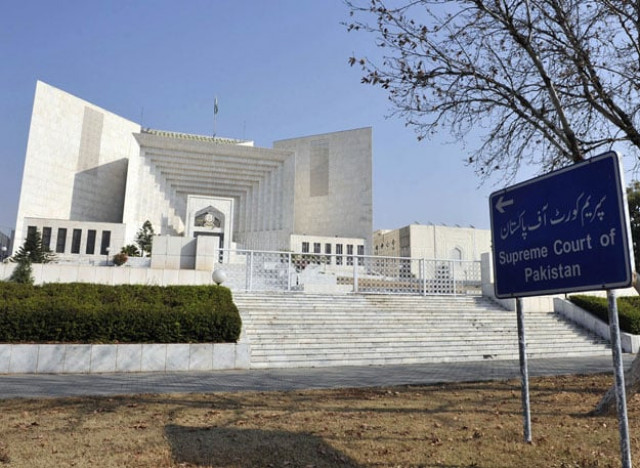18th and 21st amendments: Parliament cannot replace Islam with secularism, say SC judges
Justice Ejaz discusses the importance of the Two-Nation Theory and the Objectives Resolution

Supreme Court. PHOTO: AFP
Justice Ejaz Afzal Khan has widely discussed the importance of the Two-Nation Theory, as well as the Objectives Resolution, which is also endorsed by another judge Justice Ijaz Ahmad Chaudhry.
Justice Ejaz, in his 120-page dissenting note, says that incessant recurrence of anti-Muslim riots in India and atrocities committed against Muslims in Kashmir by the security forces at the instance of the Dehli backed government with unabated continuity also leave little doubt that the demand for a separate homeland on the basis of the Two-Nation Theory was justified.
“Islam, as aptly put by A K Dogar, petitioner in Constitutional Petition No.20 of 2010 is a structural base of the homeland founded for Muslims on the basis of the Two-Nation Theory. Therefore, parliament cannot replace Islam with secularism nor it can replace the federation with a confederation. This is what the Muslims of the subcontinent aspired and endeavored for. This is in essence the raison d’etre for the establishment of the separate homeland.”
Justice Ejaz also believes that Islam, as a system of life, has the capacity to guide us today and in all times to come as it had inthtr 14th century before, adding that time in terms of past, present and future cannot have any impact much less adverse on these values.
He also says that impolite and indiscreet behaviour of the Hindu leadership resulted in the loss of the last opportunity for Hindus and Muslims to live together.
Justice Ejaz, while discussing the Objectives Resolution, says that the resolution was adopted by the Constituent Assembly on March 12, 1949 as it was more or less a consensus document inasmuch as it was accepted as such by almost all the Muslim members of the Constituent Assembly. However, he admits that Objectives Resolution was opposed by the non-Muslim members of the Constituent Assembly, who belonged to Pakistan National Congress having its roots in the Indian National Congress.
Justice Ejaz held that those who opposed Objectives Resolution neither read the principles incorporated therein nor the system they have been culled from.
“Their opposition to the system is nothing but an opposition for the sake of opposition. At times, the name of Islam has been misused by a few bigoted, semi-learned and pseudo-scholars but for that they and not the system be blamed. Therefore, the critique of Ms Asma Jahangir [SCBA counsel] being more pedantic than scholarly, has left us unmoved,” he further holds.
On the other hand, another SC judge Justice Asif Saeed Khosa believes that the people and society of one given time cannot be held as hostage to or slave of the aspirations, objectives, values, morality or ethos of their forefathers, adding that evolution of people and societies is a reality and it would be nothing but naïve to believe or hold otherwise.
Justice Khosa says that representatives in the then Constituent Assembly of the newly created Pakistan the people of East Pakistan had fully shared the common aspirations, ideals, objectives, values, morality and ethos with their counterparts in West Pakistan at the time of adoption of the Objectives Resolution in the year 1949 before framing of a Constitution for the motherland but within a little over two decades that community of interest and vision had undergone a drastic change.
According to him, the people of East Pakistan lost their commitment to Pakistan and the lofty ideals attached to its creation, broke away and carved out a new state for themselves with new ideals and commitments.
Published in The Express Tribune, August 15th, 2015.



















COMMENTS
Comments are moderated and generally will be posted if they are on-topic and not abusive.
For more information, please see our Comments FAQ